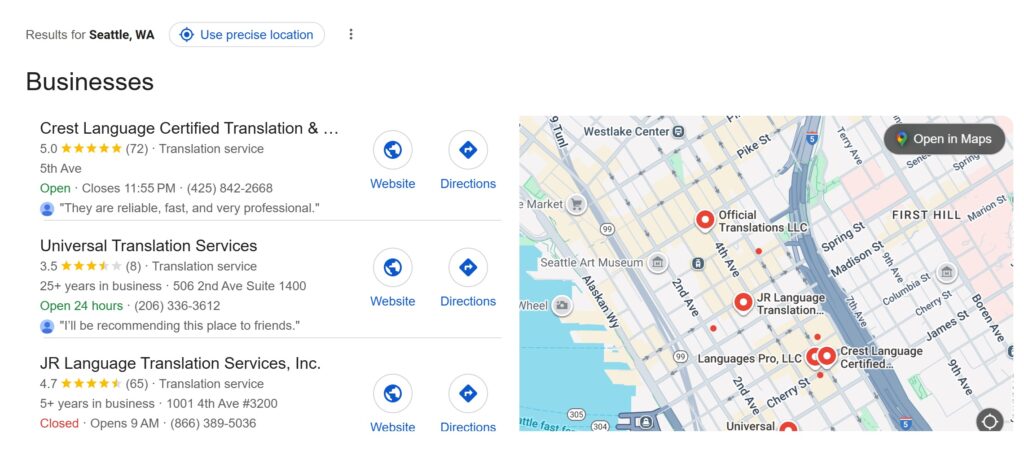Anyone who works with professional translators or has checked social media posts written by them can detect fear and uncertainty. Demand for professional translators and translation services have declined. AI has pushed out many of them and some have left or are considering leaving the industry and finding other work. But that sentiment is overblown: professional translators are still required for specialized subjects such as legal, medical, life sciences, financial compliance, technical manuals, IFUs, SDS, immigration, public health and more. Not to mention translation of creative works such as novels, poems and children stories. Certainly the generalist translators will be pushed out, but SME translators, CAT tools and DTP experts and MTPE specialists are still required.
But there is one thing that AI has decimated: the world of organic search. In past times, if a website had well written and valuable content, the search engines (which really means Google since they control 90% of the market) pushed that content to the top of the SERPs so that users got the most relevant results. Websites prospered or perished to the tune of the famous Page Rank (which is named after Google cofounder Larry Page). But not so much anymore.
The AI Overview Effect
Anyone who has checked Google can see that the top part of the page is often populated with the AI Overview (AO). While true that AO often includes clickable links, the CTR for AO is considerably lower than in classic organic search. And even if your website ranks very high on organic search, your page will be buried underneath the AO, Featured Snippets, People Also Ask and the Map Pack. Much of the traffic that used to go to websites never leaves Google now. Industry estimates show 50–70% of all searches end without a click. Many sites have seen 30–40% CTR loss immediately after AO rollout.

Studies so far (from multiple SEO tools and large publishers) show that CTR from AI Overview results is often under 1–3%. Some industries report 0.1–0.3%. Users get the answer and leave Google, resulting in a zero-click session.
Map Pack and local results are taking over commercial queries
The Local Pack — the boxed map with three listings — occupies some of the most valuable real estate on Google’s results page and is pushing down companies with nationwide offerings. Translation is a business that lends itself very well to the online world. 98% of translation services are delivered electronically. The local advantage is mostly irrelevant for translation services. True that in some cases, hard copies need to be delivered. But even then, courier services are fine. In-store visits are rare and are not required.

Yet Google increasingly injects Local Packs into searches that have no meaningful local intent. This includes:
- “German translation services”
- “technical translation services”
- “certified translation services”
- “medical translation company”
- “legal translation service”
In all of these cases, the buyer does not require a local provider, yet Google elevates geographically nearby businesses and suppresses national providers. This behavior appears to be algorithmic rather than logical, and it contributes significantly to declining organic traffic for national service businesses.
Google prefers well-known brands
Since the March 2024 and March 2025 core updates, SEO professionals have documented a significant shift in Google’s ranking behavior: a bias toward large, authoritative sites. This trend is reflected across entire industries — finance, health, law, ecommerce — and translation is no exception.
Well-known translation brands, directories, marketplaces, and aggregator sites dominate high-value queries. For example:
- Lionbridge, TransPerfect, and LanguageLine occupy top results for enterprise translation queries.
- RushTranslate frequently appears at the top for certified and immigration-focused terms.
- Large directories like Clutch and Upwork dominate “best translation services” queries.
Smaller agencies, even when producing objectively better content, now struggle to compete with domain authority rather than content quality.
Google’s Shift Toward Zero-Click Search
Multiple studies over the past few years confirm the rise of zero-click search, where users get the answer directly on the results page and never visit a website. Research from Similarweb and SparkToro found that over 60% of Google searches now end without a click, and the percentage is even higher on mobile devices. This means that even authoritative websites with strong content lose traffic simply because users never leave the search engine.
The introduction of AI Overview intensifies this long-term trend. Users receive a summarized answer, a few citations, and rarely feel the need to explore further. Publishers, agencies, and small businesses all report the same effect: increased visibility, decreased traffic.
The Invisible Cost to Small and Medium Agencies
Small and mid-sized translation agencies have traditionally relied on organic search for new business, unlike larger firms that can absorb algorithmic shifts through paid advertising, brand visibility, and established enterprise relationships. When AI Overview and Local Pack placements push organic results down the page, these smaller agencies lose qualified leads, quote requests, returning clients who previously found them through search, and visibility for their niche specialties such as SDS, medical devices, legal translation, and other regulated fields. The broader consequence is that clients are steered toward large, generic providers—and sometimes even low-quality automated solutions—while highly specialized, high-quality SMEs become harder to discover.
Is this a Google plot to increase revenue?
Google has been known to change the search algorithms in order to shake things up and create confusion in the marketplace. Google’s main purpose, unlike its famous slogan of “Don’t be evil,” is to make lots of money. Was AI Overview rolled out to give the user a better search experience or to increase Google’s bottom line? Perhaps a bit of both? Many industry seers are saying that the Google search experience has deteriorated.
Conclusion- AI Didn’t Kill Translators, But It May Kill Discovery
AI is not destroying translation as a profession. Specialized translators are still indispensable, and the need for legal, medical, technical, and regulated translation isn’t going away anytime soon. What AI is destroying is the pathway by which clients discover talent. When Google decides what users see — and increasingly shows its own AI-generated content — independent translators and boutique agencies become harder to find. The threat isn’t that AI will replace translators. The threat is that search engines will hide them.
If the web becomes a walled garden of AI summaries, map packs, and brand-heavy rankings, then thousands of skilled linguists will simply never be seen. And that is far more damaging to the industry than machine translation ever was.
References
- SparkToro & Similarweb, “2024 Zero-Click Search Study: For every 1,000 EU Google Searches, only 374 clicks go to the Open Web. In the US, it’s 360.”
Read the study - Matt G. Southern, “Google CTRs Drop 32% For Top Result After AI Overview Rollout,” Search Engine Journal, July 21, 2025.
Read the article - Danny Goodwin, “Google AI Overviews drive 61% drop in organic CTR, 68% in paid,” Search Engine Land, November 4, 2025.
Read the article - Lily Ray, “IndexWatch: SEO Losers in Google US Search 2024,” SISTRIX, February 6, 2025.
Read the report - Jessica Davies, “Google AI Overviews linked to 25% drop in publisher referral traffic, new data shows,” Digiday, August 15, 2025.
Read the article





